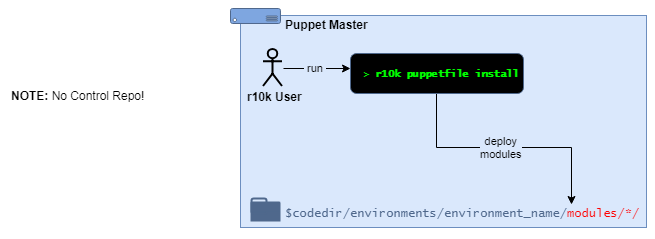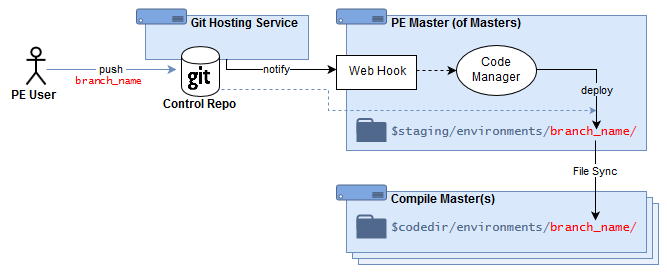Puppet deployment scenarios
SIMP 6.4+ is intended to support the Puppet deployment scenarios described in this article.
Contents:
Overview
Deployment strategies vary widely, based on a site’s infrastructure, existing policies, and administrative considerations. SIMP broadly groups these strategies into two high-level deployment scenarios, with some important variations:
| Deployment Scenario | Variation | r10k command | Control Repo? | Module | Autodeploy |
|---|---|---|---|---|---|
| Local (Puppetfile-only) | Local module repos | r10k puppetfile install | Local (from RPMs) | ||
| Manual r10k | r10k deploy environment |
|
(Git hosting service) | ||
| Webhook + r10k | r10k deploy environment | ||||
| PE Code Manager | puppet code deploy |
Local (Puppetfile-only) Scenarios
Local: Deploying from Local module repos
This is the initial deployment scenario immediately after Installing SIMP from an ISO.
Under this scenario, a local r10k user will:
- deploy Puppet modules from an existing Puppet environment directory.
- use the command
r10k puppetfile installto deploy the modules defined in the localPuppetfile. - the module repos can be git repositories on the local filesystem, referenced via
file://urls.
Notes:
- The Puppet environment directory and
Puppetfilemust exist beforer10k puppetfile installis run - The modules in the
Puppetfileare defined withfile://URLs, and pull from Git repositories on the local file system
Control Repository Scenarios
Administrators of all control repository scenarios are assumed to have enough git and r10k (or Code Manager) expertise to manage their own infrastructure.
This includes:
- Arranging their own external git-hosting service
- Managing their own Puppet control repository
- Updating their modules repositories with the contents delivered on the local filesystem by SIMP Puppet module RPMs.
Control Repo: Manual r10k deploy
Puppet admins:
- maintain a Puppet control repository from an external git service.
An r10k user logs into the Puppet master and manually deploys entire Puppet environment directories (one per branch) from the command line:
r10k deploy environment [ENVIRONMENT]puppet code deploy [ENVIRONMENT](Puppet Enterprise)
Control Repo: Webhook-triggered r10k deploy
Puppet admins:
- Maintain a Puppet control repository (and Puppet module repositories) in an external git-hosting service
- Deploy a Puppet environment by pushing updates to a control repository branch
When a control repository branch is updated, it automatically triggers an environment deployment on the Puppet master:
- The Git-hosting service uses a webhook to notify the Puppet master about the branch that was changed
- The webhook on the Puppet master triggers r10k to deploy the branch as an environment
Control Repo: PE Code Manager & File Sync
Puppet admins:
- Maintain a Puppet control repository (and Puppet module repositories) in an external git-hosting service
- Deploy a Puppet environment by pushing updates to a control repository branch
When a control repository branch is updated, it automatically triggers an environment deployment on the Puppet master:
- The Git-hosting service uses a webhook to notify the PE master/MoM about the branch that was changed
- The webhook on the Puppet master triggers PE Code Manager to deploy the branch as a staged environment
- The PE File Sync service distributes the staged environment to any compile masters, and promotes the code from staging to live use.
References
- SIMP Environments — overview & terminology of "Environments" within SIMP
- (Source for https://draw.io diagrams: SIMP 6.4 use case - deployment scenarios.xml)



